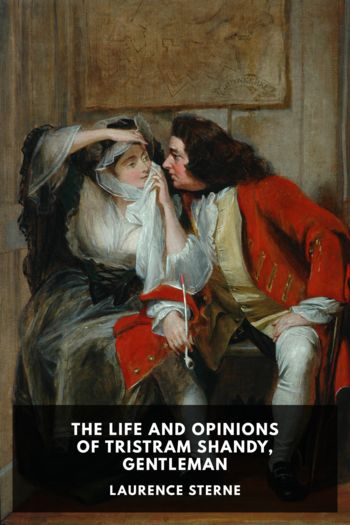The Life and Opinions of Tristram Shandy, Gentleman, Laurence Sterne [rosie project txt] 📗

- Author: Laurence Sterne
Book online «The Life and Opinions of Tristram Shandy, Gentleman, Laurence Sterne [rosie project txt] 📗». Author Laurence Sterne
I have a strong propensity in me to begin this chapter very nonsensically, and I will not baulk my fancy.—Accordingly I set off thus:
If the fixture of Momus’s glass in the human breast, according to the proposed emendation of that arch-critick, had taken place,⸺first, This foolish consequence would certainly have followed,—That the very wisest and very gravest of us all, in one coin or other, must have paid window-money every day of our lives.
And, secondly, That had the said glass been there set up, nothing more would have been wanting, in order to have taken a man’s character, but to have taken a chair and gone softly, as you would to a dioptrical beehive, and look’d in,—view’d the soul stark naked;—observed all her motions,—her machinations;—traced all her maggots from their first engendering to their crawling forth;—watched her loose in her frisks, her gambols, her capricios; and after some notice of her more solemn deportment, consequent upon such frisks, etc.⸺then taken your pen and ink and set down nothing but what you had seen, and could have sworn to:—But this is an advantage not to be had by the biographer in this planet;—in the planet Mercury (belike) it may be so, if not better still for him;⸺for there the intense heat of the country, which is proved by computators, from its vicinity to the sun, to be more than equal to that of red-hot iron,—must, I think, long ago have vitrified the bodies of the inhabitants, (as the efficient cause) to suit them for the climate (which is the final cause); so that betwixt them both, all the tenements of their souls, from top to bottom, may be nothing else, for aught the soundest philosophy can show to the contrary, but one fine transparent body of clear glass (bating the umbilical knot)—so that, till the inhabitants grow old and tolerably wrinkled, whereby the rays of light, in passing through them, become so monstrously refracted,⸺or return reflected from their surfaces in such transverse lines to the eye, that a man cannot be seen through;—his soul might as well, unless for mere ceremony, or the trifling advantage which the umbilical point gave her,—might, upon all other accounts, I say, as well play the fool out o’doors as in her own house.
But this, as I said above, is not the case of the inhabitants of this earth;—our minds shine not through the body, but are wrapt up here in a dark covering of uncrystalized flesh and blood; so that, if we would come to the specific characters of them, we must go some other way to work.
Many, in good truth, are the ways, which human wit has been forced to take, to do this thing with exactness.
Some, for instance, draw all their characters with wind-instruments.—Virgil takes notice of that way in the affair of Dido and Aeneas;—but it is as fallacious as the breath of fame;—and, moreover, bespeaks a narrow genius. I am not ignorant that the Italians pretend to a mathematical exactness in their designations of one particular sort of character among them, from the forte or piano of a certain wind-instrument they use,—which they say is infallible.—I dare not mention the name of the instrument in this place;—’tis sufficient we have it amongst us,—but never think of making a drawing by it;—this is ænigmatical, and intended to be so, at least ad populum:—And therefore, I beg, Madam, when you come here, that you read on as fast as you can, and never stop to make any inquiry about it.
There are others again, who will draw a man’s character from no other helps in the world, but merely from his evacuations;—but this often gives a very incorrect outline,—unless, indeed, you take a sketch of his repletions too; and by correcting one drawing from the other, compound one good figure out of them both.
I should have no objection to this method, but that I think it must smell too strong of the lamp,—and be render’d still more operose, by forcing you to have an eye to the rest of his Non-naturals.⸺Why the most natural actions of a man’s life should be called his Non-naturals,—is another question.
There are others, fourthly, who disdain every one of these expedients;—not from any fertility of their own, but from the various ways of doing it, which they have borrowed from the honourable devices which the Pentagraphic Brethren4 of the brush have shown in taking copies.—These, you must know, are your great historians.
One of these you will see drawing a full-length character against the light;—that’s illiberal,—dishonest,—and hard upon the character of the man who sits.
Others, to mend the matter, will make a drawing of you in the Camera;—that is most unfair of all,—because, there you are sure to be represented in some of your most ridiculous attitudes.
To avoid all and every one of these errors in giving you my uncle Toby’s character, I am determined to draw it by no mechanical help whatever;⸺nor shall my pencil be guided by any one wind-instrument which ever was blown upon, either on this, or on the other side of the Alps;—nor will I consider either his repletions or his discharges,—or touch upon his Non-naturals—but, in a word, I will draw my uncle Toby’s character from his Hobbyhorse.
XXIVIf I was not morally sure that the reader must be out of all patience for my uncle Toby’s character,⸺I would here previously have convinced him that there is no instrument so fit to draw such a thing with, as that which I have pitch’d upon.
A man





Comments (0)